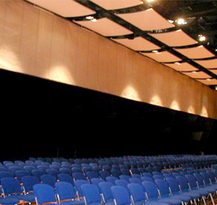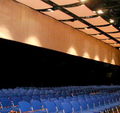by: Mirjam Visser, 2010-11-26 11:19:04 UTC
Sustainability Aspects: Glass is recyclable, resists molds

The versatility of glass as a fiber makes it a unique industrial textile material. Fiber glass in fabric form offers an excellent combination of properties from high strength to fire resistance. They do not detoriate under sunlight, they reflect and filter light.
Wide ranges of yarn sizes and weave patterns provide huge number of design potential allowing the end user to choose the best combination for material performance, economics and product flexibility.
It’s fire resistance, resistance against mould and moths makes it suitable as fire curtains in public spaces like a theater.
Its characteristics
- Dimensional Stability: Fiber glass does not stretch or shrink after exposure to extremely high or low temperatures.
- Moisture Resistance: Glass fibers do not absorb moisture, or change physically or chemically when exposed to water.
- High Strength: In textile form, this strength can be unidirectional or bidirectional.
- Fire Resistance: Fiber glass will not burn or support combustion. It retains approximately 25% of its initial strength at 1000 deg F (540 deg C)
- Chemical Resistance: most chemicals have little or no effect on glass fiber.
- Electrical Properties: fiber glass is an excellent material for electrical insulation.
- Thermal Conductivity: a low coefficient of thermal expansion combined with high thermal conductivity properties make glass fabric a dimensionally stable material that rapidy dissipates heat as compared to asbestos and organic fibers.
Images

flexible fire wall from glass

flexible fire wall from glass
by Showtex


Comments by our Users
Be the first to write a comment for this item.